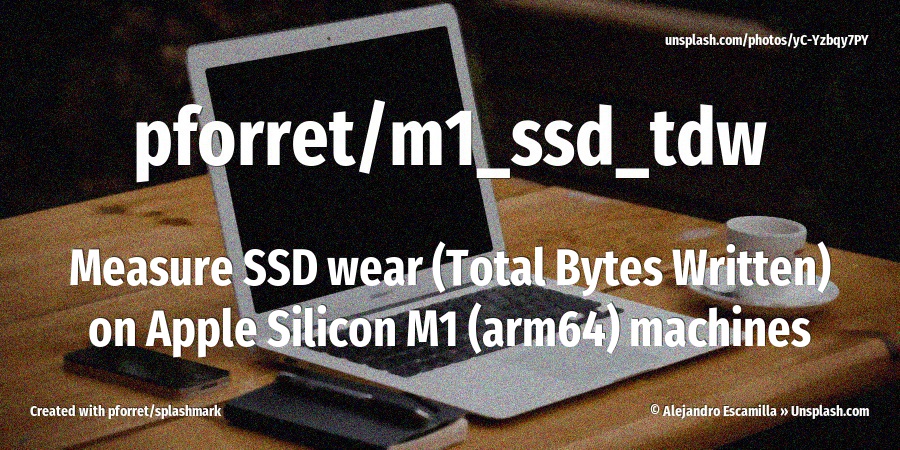Detecting excessive SSD wear on Apple Silicon M1 machines
22 Feb 2021Some more professional users of the new M1 Macbooks are experiencing extremely high drive writes over relatively short time. The most severe cases have “consumed” about 10-13% of the maximum warrantable TBW (Total Bytes Written) value of the SSDs (given their capacity & using values for equivalent market-available NVMe drives).
• Feb 17, 2021 linustechtips.com
This article, based on original tweets by Hector Martin and Longhorn , worried me. As the owner of a Mac Mini M1, I didn’t want my built-in, irreplaceable, SSD to wear out after one or two years. Most of all, I wanted to know how bad the situation was for my machine.
The stats of the SSD can be consulted through smartctl, the relevant line is “Data Units Written”. I wanted to relate this to the size of the SSD disk, to have a multiplier index. E.g. I have a 1TB SSD disk, and 120TB has already been written to disk: the multiplier = 120/1 = 120.
> sudo smartctl -a /dev/disk0
=== START OF INFORMATION SECTION ===
Model Number: APPLE SSD AP0512Q
(...)
=== START OF SMART DATA SECTION ===
SMART overall-health self-assessment test result: PASSED
SMART/Health Information (NVMe Log 0x02)
(...)
Data Units Read: 108,887,826 [55.7 TB]
Data Units Written: 98,244,501 [50.3 TB] <<<<<
(...)
I also found some indications of how many rewrites an SSD can support (i.e what is the max multiplier?). Hector Martin also came up with stats for that.
Update on M1 SSD wear issue: Available data suggests that write endurance ratings are not proportional to drive size.
- 256GB model: ~2000TB [1700-2300]
- 2TB model: ~5000TB [4300-6000]
via Hector Martin

I put all this logic into a simple bash script, poetically called “m1_ssd_tbw”. It’s easy to install on a Mac M1 and gives your clear information on the wear of your disk.
> ./m1_ssd_tbw info
Password:
SSD disk size: 494 GB
SSD disk used: 146 GB
SSD bytes written: 50 TB
SSD current index: 101 x
SSD max index: 5800 x
SSD wear = 1.74 %
So my 500GB (1/2 TB) disk has had 50TB written to it. This is a multiplier index of 101. The estimated max multiplier (heuristic) is 5800 (which means: writing 2.9 PB (petabyte) on it over time). Comparing these two: I am at +- 2% of the lifetime of my disk, after 2 months. If this doesn’t suddenly speed up, this would give my disk a lifetime of at least 8 years. No panic necessary.


